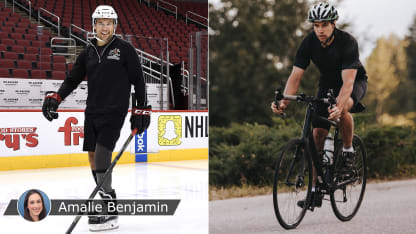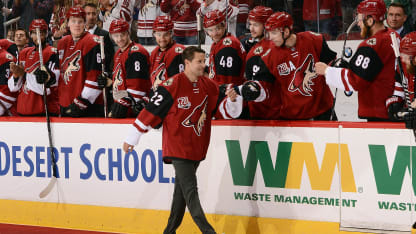"It's obviously a huge sacrifice and commitment," said Craig Cunningham, who played 63 NHL games with the Boston Bruins and Coyotes. "I think in talking to him, he just saw everything that went on in the hospital, but not only what I went through, but how all the doctors and nurses and the hospital took care of me and how hard they worked.
"[Cardiac screening] has been the same for years now and no one's doing anything different, and we want to do something different that's going to make a difference and my brother just jumped on board."
Craig Cunningham, 27, said the foundation is working to fund development of an app that connects to a heart rate monitor worn on the wrist. The app would track heart rate variability and would flag irregularities and alert a doctor, who can assess the situation.
"We're hoping they're going to be able to predict sudden cardiac arrest before it happens," Craig Cunningham said.
That could save lives.
That's why Ryan Cunningham is riding this week, even with the August heat beating down on him through Utah and into Arizona. The timing might not have been optimal but given that his fiancée Ellen Clark is a teacher and is driving behind him to provide support through the trip, he had limited options.
Craig Cunningham and their mother, Heather, will also join up with the ride halfway through.
The ride has not been without its challenges. On the third day, Aug. 5, Cunningham opted to take I-90, rather than the Hiawatha Trail, from Mullan, Idaho to Missoula, Montana. He got 10 flat tires and spent most of his day repairing his bike on the side of the interstate.
At one point, he started walking his bike along the route, hoping he could attract the attention of someone. He got lucky. A couple of cyclists, who had a pump, pulled over, giving him CO2 cartridges and a new tube.
He eventually made it 109 miles that day.
It was frustrating, but nothing compared to what his brother has gone through.
Craig Cunningham had multiple setbacks during his recovery, including with his prosthesis and after his amputation. His brother watched him focus not on the difficulties of his situation, not on what could have been, but what was in his control.
The Coyotes hired Craig Cunningham last season to scout. This season he will add to his duties with some time in Tucson working with the Roadrunners, trying out the player development side of the game.
"One thing he does really well is he doesn't look back," said Ryan Cunningham, who remains on target to arrive in Tucson on Aug. 18. "It would be so painful to be like, yeah, I was captain of an AHL team and I was teetering on the brink of breaking into the NHL. It would just hurt so much to sit and wonder what it would have taken, how close you were to breaking into the League. He doesn't dwell and he doesn't look back."
That's especially true now as Craig Cunningham finds the balance of what he can and cannot do given his amputation and prosthesis, as he tries to gain a foothold in the NHL in a different role than he anticipated, as he works with his foundation to raise money and help others.




















